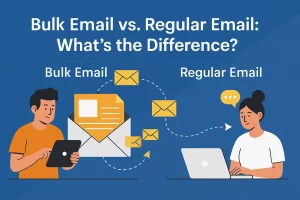Data privacy is a critical concern in bulk email marketing. With stringent regulations worldwide, it’s vital for businesses to ensure their email campaigns are compliant to avoid penalties and build customer trust. Here’s a detailed look at key data privacy laws that impact bulk email marketing and how to adhere to them:
1. Understanding GDPR (General Data Protection Regulation)
- Applicable to companies targeting customers in the European Union (EU).
- Requires businesses to obtain explicit consent before sending marketing emails.
- Marketers must provide a clear opt-in option, avoid pre-checked boxes, and ensure users can easily withdraw consent.
- Include a privacy policy link in emails detailing how user data is collected, stored, and used.
2. Complying with CAN-SPAM (Controlling the Assault of Non-Solicited Pornography And Marketing Act)
- U.S.-based regulation that focuses on transparency in email marketing.
- Requires a visible unsubscribe link in every email and a valid physical postal address.
- Misleading subject lines or false sender information are prohibited.
- Marketers have 10 business days to remove users from mailing lists upon their request to unsubscribe.
3. Understanding CCPA (California Consumer Privacy Act)
- Applicable to businesses collecting data from California residents.
- Gives consumers the right to know what personal information is being collected and how it’s being used.
- Users must be able to opt out of the sale of their personal information, and businesses must honor these requests.
- Ensure email campaigns include a clear opt-out option and respect privacy preferences.
4. CASL (Canada’s Anti-Spam Legislation)
- Applies to emails sent to or from Canada.
- Requires express or implied consent from recipients before sending emails.
- Must include a clear opt-out mechanism and accurate sender information.
- Maintain records of consent to demonstrate compliance during audits.
5. Best Practices for Consent Management
- Implement double opt-in methods to confirm users’ consent.
- Regularly clean and update your email lists to remove inactive or unengaged users.
- Ensure that consent records are easily accessible for audits and user requests.
6. Transparency and Honesty in Data Collection
- Clearly state how user data will be used when users sign up for newsletters.
- Use privacy-focused language to reassure subscribers that their data will not be sold or shared without their permission.
- Provide a detailed privacy policy that is easily accessible from all email communications.
7. Importance of Data Security in Bulk Email Marketing
- Use encrypted email services and secure servers to protect user data.
- Limit access to customer data within the organization to minimize risks.
- Regularly audit email marketing practices and data handling procedures to ensure ongoing compliance.
Conclusion:
Staying compliant with data privacy laws like GDPR, CAN-SPAM, CCPA, and CASL is crucial for bulk email marketing success. By prioritizing transparency, obtaining consent, and offering clear opt-out options, businesses can foster trust with their audience and avoid potential legal issues. In a landscape where consumer data is highly valued, safeguarding it can set your brand apart and ensure long-term customer loyalty.




